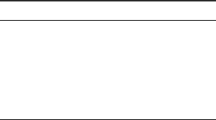Abstract
Space discretization of some time-dependent partial differential equations gives rise to systems of ordinary differential equations in additive form whose terms have different stiffness properties. In these cases, implicit methods should be used to integrate the stiff terms while efficient explicit methods can be used for the non-stiff part of the problem. However, for systems with a large number of equations, memory storage requirement is also an important issue. When the high dimension of the problem compromises the computer memory capacity, it is important to incorporate low memory usage to some other properties of the scheme. In this paper we consider Additive Semi-Implicit Runge–Kutta (ASIRK) methods, a class of implicit-explicit Runge–Kutta methods for additive differential systems. We construct two second order 3-stage ASIRK schemes with low-storage requirements. Having in mind problems with stiffness parameters, besides accuracy and stability properties, we also impose stiff accuracy conditions. The numerical experiments done show the advantages of the new methods.







Similar content being viewed by others
References
Ascher, U., Ruuth, S., Spiteri, R.: Implicit–explicit Runge–Kutta methods for time-dependent partial differential equations. Appl. Numer. Math. 25, 151–167 (1997)
Boscarino, S.: Error analysis of IMEX Runge–Kutta methods derived from differential-algebraic systems. SIAM J. Numer. Anal. 45(4), 1600–1621 (2007)
Boscarino, S.: On an accurate third order implicit–explicit Runge–Kutta method for stiff problems. Appl. Numer. Math. 59(7), 1515–1528 (2009)
Boscarino, S., Russo, G.: On a class of uniformly accurate IMEX Runge–Kutta schemes and applications to hyperbolic systems with relaxation. SIAM J. Sci. Comput. 31(3), 1926–1945 (2009)
Caflisch, R.E., Jin, S., Russo, G.: Uniformly accurate schemes for hyperbolic systems with relaxation. SIAM J. Numer. Anal. 34(1), 246–281 (1997)
Calvo, M., Franco, J., Rández, L.: Minimum storage Runge–Kutta schemes for computational acoustics. Comput. Math. Appl. 45(1), 535–545 (2003)
Calvo, M., Franco, J.M., Montijano, J.I., Rndez, L.: On some new low storage implementations of time advancing Runge–Kutta methods. J. Comput. Appl. Math. 236(15), 3665–3675 (2012)
Carpenter, M.H., Kennedy, C.A.: Fourth-order 2n-storage Runge–Kutta schemes. Nasa Technical Memorandum 109112 (1994)
Ferracina, L., Spijker, M.: Strong stability of singly-diagonally-implicit Runge–Kutta methods. Appl. Numer. Math. 58(11), 1675–1686 (2008)
Gottlieb, S., Shu, C.: Total variation diminishing Runge–Kutta schemes. Math. Comput. 67(221), 73–85 (1998)
Gottlieb, S., Shu, C.W., Tadmor, E.: Strong stability-preserving high-order time discretization methods. SIAM Rev. 43(1), 89–112 (2001)
Hairer, E.: Order conditions for numerical methods for partitioned ordinary differential equations. Numer. Math. 36(4), 431–445 (1981)
Happenhofer, N., Koch, O., Kupka, F.: IMEX Methods for the ANTARES Code. ASC Report 27 (2011)
Higueras, I., Mantas, J., Roldán, T.: Design and implementation of predictors for additive semi-implicit Runge–Kutta methods. SIAM J. Sci. Comput. 31(3), 2131–2150 (2009)
Hundsdorfer, W., Ruuth, S.J.: Imex extensions of linear multistep methods with general monotonicity and boundedness properties. J. Comput. Phys. 225, 2016–2042 (2007)
Kennedy, C.A., Carpenter, M.H.: Additive Runge–Kutta schemes for convection-diffusion-reaction equations. Appl. Numer. Math. 44(1–2), 139–181 (2003)
Kennedy, C.A., Carpenter, M.H., Lewis, R.M.: Low-storage, explicit Runge–Kutta schemes for the compressible Navier–Stokes equations. Appl. Numer. Math. 35(3), 177–219 (2000)
Ketcheson, D.I.: Highly efficient strong stability-preserving Runge–Kutta methods with low-storage implementations. SIAM J. Sci. Comput. 30(4), 2113–2136 (2008)
Ketcheson, D.I.: Runge–Kutta methods with minimum storage implementations. J. Comput. Phys. 229(5), 1763–1773 (2010)
Koch, O., Kupka, F., Löw-Baselli, B., Mayrhofer, A., Zaussinger, F.: SDIRK methods for the ANTARES code. ASC Report 32 (2010)
Kraaijevanger, J.: Contractivity of Runge–Kutta methods. BIT Numer. Math. 31(3), 482–528 (1991)
Pareschi, L., Russo, G.: Implicit–explicit Runge–Kutta schemes for stiff systems of differential equations. Recent Trends Numer. Anal. 3, 269–289 (2000)
Pareschi, L., Russo, G.: High order asymptotically strong-stability-preserving methods for hyperbolic systems with stiff relaxation. In: Hyperbolic Problems: Theory, Numerics, Applications, pp. 241–251. Springer: Berlin (2003)
Shu, C., Osher, S.: Efficient implementation of essentially non-oscillatory shock-capturing schemes. J. Comput. Phys. 77(2), 439–471 (1988)
Spiteri, R., Ruuth, S.: A new class of optimal high-order strong-stability preserving time-stepping schemes. SIAM J. Numer. Anal 40, 469–491 (2002)
Van Der Houwen, P.J.: Construction of integration formulas for initial value problems. North Holland (1977)
Williamson, J.: Low-storage Runge–Kutta schemes. J. Comput. Phys. 35(1), 48–56 (1980)
Zhong, X.: Additive semi-implicit Runge–Kutta methods for computing high-speed nonequilibrium reactive flows. J. Comput. Phys. 128(1), 19–31 (1996)
Acknowledgments
The authors would like to thank the anonymous reviewers for their valuable comments and suggestions. Supported by Ministerio de Economía y Competividad, project MTM2011-23203.
Author information
Authors and Affiliations
Corresponding author
Rights and permissions
About this article
Cite this article
Higueras, I., Roldán, T. Construction of Additive Semi-Implicit Runge–Kutta Methods with Low-Storage Requirements. J Sci Comput 67, 1019–1042 (2016). https://doi.org/10.1007/s10915-015-0116-2
Received:
Revised:
Accepted:
Published:
Issue Date:
DOI: https://doi.org/10.1007/s10915-015-0116-2
Keywords
- Additive Runge–Kutta methods
- Strong stability preserving
- Low-storage
- Stiff problems
- Time discretization schemes




